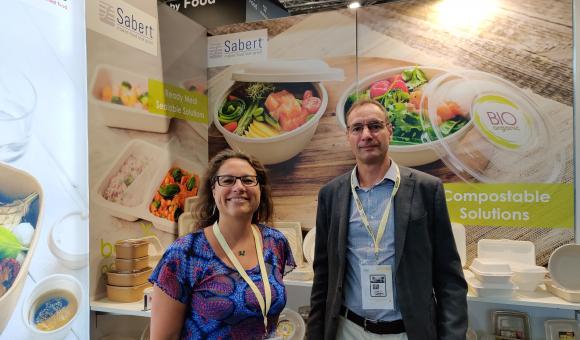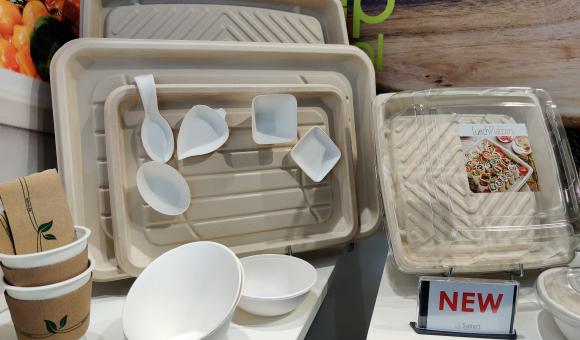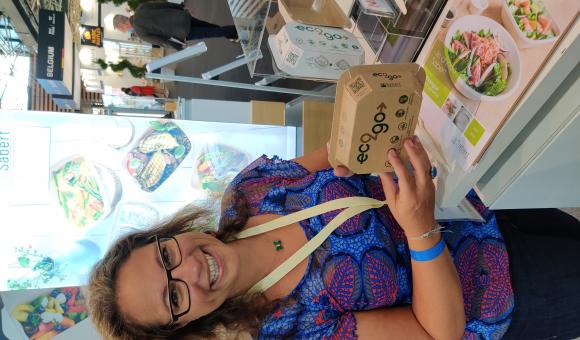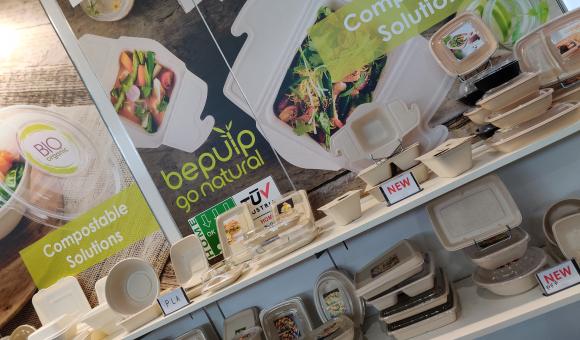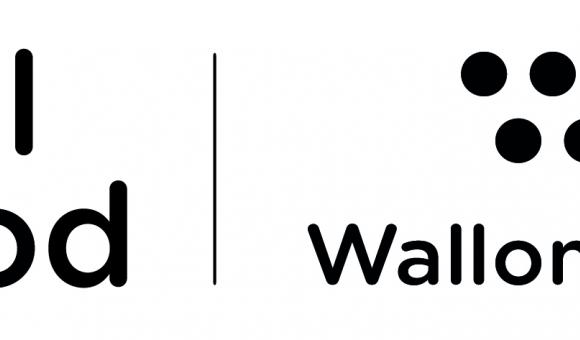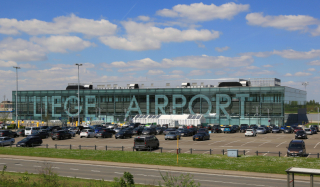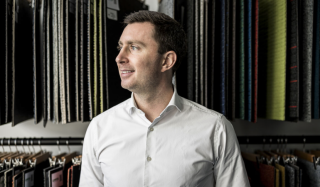Due to sustainable development, uberisation and street food, the HoReCA and Food Services sectors are undergoing profound changes with the boom in home deliveries and takeaway sales. How are companies adapting to these changes? At SIRHA in Lyon, Hughes Moens, Sales & Marketing Director, shared the experience of Sabert, which specialises in sustainable packaging for food and ready meals. Innovation, sustainable development, food trends and exports - we took stock of the situation with the Nivelles-based company.
Wallonia Export & Investment Agency: Hello, Hughes. We are here at SIRHA, one of the largest Food Services trade shows in the world. The general public may not know the company name, Sabert, but is bound to have had the opportunity to hold the products you are presenting here in their hands. Can you confirm this?
Hughes Moens: Yes, it's something like that. If you've ever ordered a meal for delivery or ordered a takeaway, the chances are that you have. As you can see, at Sabert we specialise in food packaging, especially for the transport and presentation of ready meals. So if you are a fan of street food or food delivery apps, you probably use our products.
How long has Sabert been around? Are you a leader in your field?
HM: Sabert Europe has been around for 30 years now. While we are a subsidiary of Sabert US, we have been able to grow independently to become a market leader in sustainable food packaging and tableware on the European continent. In our company in Nivelles, we are responsible for the entire production process, from the raw materials to the end product. Our products have become even more popular with the boom in home delivery and takeaway food following successive COVID-19 lockdowns, and now the emergence of dark kitchens and environmental expectations.
And who are your main customers?
HM: We mainly offer our product ranges to the fast-food and catering industries, as well as to more traditional restaurant owners, for delivery or take-away sales. In addition to this target audience, we also supply more industrial customers, such as producers of salads or prepared meals intended for sale in supermarkets.
As you are at SIRHA today, I imagine that you also export your products?
HM: Absolutely. We only sell about 10% of our production in Belgium. The rest is distributed elsewhere in Europe, mainly in France, the United Kingdom, Germany, etc. In general where environmental awareness and laws are more advanced and where the culinary scene is more dynamic. As you can imagine, food trends from London, Paris and Berlin are the ones that set the tone for our future consumption practices. We keep a close eye on these countries, because what works there usually comes to us soon afterwards. The advantage of having our own production unit here in Wallonia is that when we have a new concept that works, we can develop, launch and test it fairly quickly.
What has been the biggest change in your business in recent years?
HM: All our customers take sustainable development into account: the choice of food packaging is now largely determined by the type of material used for the packaging, and by a concern for the end of the product's life - is it recyclable, compostable?
In parallel, we must also take into account the changes to the legislation on single-use plastic packaging; some plastic products are banned (straws, plates, single-use cutlery), others are "discouraged" (taxes, etc.).
Both of these factors have had a profound effect on our industry over the past two years, but they are also a source of innovation and business opportunities.
At a time when 'disposable' plastic packaging is being increasingly criticised, have you put in place a sustainable development strategy to combat the production of plastic waste?
HM: Absolutely. We are very committed to this. Since 2010, we have had a real sustainable development strategy for our products so we can constantly improve them and make them more environmentally friendly. For the past four years, all our PET products have been made of 100% post-consumer recycled PET. In 2011, we also introduced products made from vegetable fibre, derived from sugar cane pulp, a non-food agricultural waste that is 100% compostable. At the time, we were a pioneer in this type of product and today we are a recognised leader throughout Europe.
Do you think that plastic will eventually disappear from your products?
HM: Not totally. We are observing that sales of 100% plastic solutions are down significantly. More and more professionals are avoiding the use of plastic and instead choosing natural fibre solutions. But we will not be able to replace plastic in the short term. Fibre is not yet strong enough for all uses and some of the advantages of PET, such as transparency for seeing the packaged products, are still essential in our business.
However, it will always be possible to improve recycling, and integrate plastic into closed circuits. Technically, everything is feasible but the difficulty lies in the collection.
Does Wallonia have good infrastructure for recycling and supplying recycled PET?
HM: In Wallonia, we are in the upper European average for these recycling channels. That's pretty good, But for our raw materials, we go to countries which have better organised sectors. For example, the Netherlands and Germany already have channels for the recovery of 'returnable' plastics, which we don't have here, as everything is collected but mixed together and therefore of insufficient quality for our production.
You are present at SIRHA with AWEX/WALFOOD today. Are you presenting any new projects? What do you expect from this week?
HM: We already have the opportunity to benefit from this 'Wallonia' infrastructure, which fits well with our universal values. Thanks to the Wallonia Export-Investment Agency, we have access to trade shows that would be too expensive for us to attend on our own. This is a great opportunity for us to present our latest innovations, such as our Buddha bowl" range, which is suitable for Poke salads. The audience here is totally in line with our export strategy. We already have a good reputation on the French market, so it's up to us to break through even more in France by using our reputation and promoting our customers (some of whom are also present at SIRHA). Here we can meet both independent restaurant owners and industrialists looking for large-scale solutions. It is full and it allows us to develop our reputation and sales in our sector.
About Wal Food
Are you looking for a production method (organic, halal, kosher, etc.)? A private label (distributor branded products)? Are your activities based on a type of packaging (vacuum, frozen, smoked, etc.)?
Visit Wal Food, a site that lists over 300 walloons companies active in the following sectors:
Beers and spirits with character; Bakery, confectionary, biscuits...; Chocolate and confectionery; Water and non-alcoholic drinks; Spices and condiments; Fruits and vegetables; Food ingredients; Fish, crustaceans and shellfish; Delicatessen products; Dairy and egg products; Commercial and collective catering; Meat and cold cuts.
For information on these businesses or the potential of the Walloon agrifood sector, you only need one address: agrifood@awex.be
Author : Jonathan Avau (Wallonia Export)
